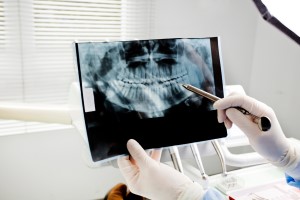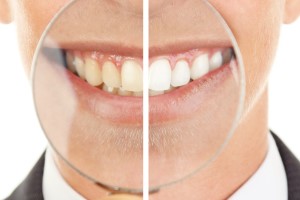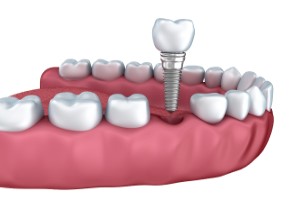What are Signs of TMJ? [Temporomandibular Disorder]

Eating, speaking, chewing gum: All these can suddenly become difficult if there is pain in the temporomandibular joint, or TMJ. Jaw pain can be worrisome, but before panicking, it is important to understand that most TMJ disorders improve with at-home care. Pain may resolve in a few days but can sometimes come back in cycles. For some people, the pain may continue and develop into a significant chronic problem. The effective way to deal with a possible bout of TMJ is to understand what can cause these disorders, what the signs and symptoms are and how to get treatment.
Recognizing and treating TMJ
According to the U.S. Department of Health and Human Services, an estimated 10 million Americans or more experience TMJ disorders, but the causes of jaw pain are varied and sometimes difficult to diagnose. TMJ can occur due to damage or wear and tear to the cartilage in the jaw joint or if the disk that sits between the bones of the joint moves out of place or breaks down, interrupting the smooth movement of the jaw. Gender can also play a role: TMJ is more common in women than in men, but the reason why is not completely known. There are other risk factors as well:
- Jaw trauma
- Genetics
- Teeth grinding and clenching
- Arthritis
- Certain connective tissue diseases
Unfortunately, in many cases, the reasons for developing TMJ are unclear.
Signs and symptoms
Temporomandibular joint pain is often described as a general pain in the chewing muscles and jaw joints. The pain can be concentrated on only one or on both sides of the jaw. Pain can also spread upwards through the face or down into the neck. Range of motion in the joint may be limited, with pain increasing the wider the jaw extends. The top and bottom teeth may not align normally and there may be stiffness or even locking of the jaw. Painful clicking, popping or grinding sounds are not uncommon.
At-home remedies
To help improve the pain through self-care, focus on eating soft foods and using icepacks and gentle stretching techniques to help ease the pain. Try to avoid extending the jaw in actions like yawning or yelling. Acetaminophen, ibuprofen and aspirin are over-the-counter medications that can help reduce inflammation and ease pain. If the pain does not improve or worsens after several days of at-home treatment, consider calling a doctor or dentist.
Further treatment
Once a TMJ disorder has been diagnosed by a doctor or dentist, further treatment can include stronger prescription medications like muscle relaxers or pain relievers. There are oral devices that can help prevent teeth grinding and jaw clenching, which may relieve symptoms and aid in recovery.
Conclusion
The first steps in treating TMJ should be trying the least-invasive remedies. While TMJ pain is never pleasant, it is often temporary and mild pain relief can be all that is needed. In rare cases, surgery or more serious treatments may be necessary. If symptoms worsen or your jaw mobility is extremely limited, call a doctor or dentist to set up an examination.
Request an appointment here: https://jacksonheightdental.com or call 82nd St. Dental at (718) 476-5555 for an appointment in our Jackson Heights office.
Check out what others are saying about our services on Yelp: Read our Yelp reviews.
Recent Posts
A TMJ dentist is a dentist who is trained in general dentistry but continues their education with a focus on the temporomandibular joint and its disorders. They spend their days treating general dental conditions, however, much of their efforts are spent diagnosing, managing, and treating TMJ disorders.TMJ dentists are great resources to utilize when suffering…
Thinking your teeth grinding is caused by stress and anxiety? Grinding your teeth is also known as clenching your teeth and can indeed be a symptom of experiencing various levels of stress and/or anxiety. You can grind your teeth during the day or at night when you are sleeping. You may realize that you are…
Understanding what is necessary to prepare for oral surgery is important for the success of the procedure. While many dental patients are concerned about the recovery process after surgery, they should also be concerned about getting ready for the procedure. When patients are fully prepared, they are more likely to experience positive outcomes.Oral surgery includes…
Dental inlays are a treatment option used to rebuild, renew and restore teeth that are in bad shape. They often get overlooked as they are not used as commonly as dental fillings or crowns. Nonetheless, they are a great option for treating molar teeth that are damaged due to injury, decay or even discoloration. Keep…






